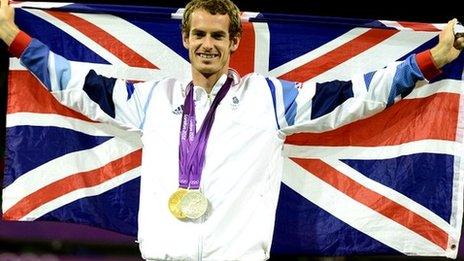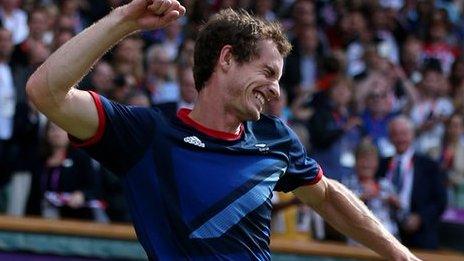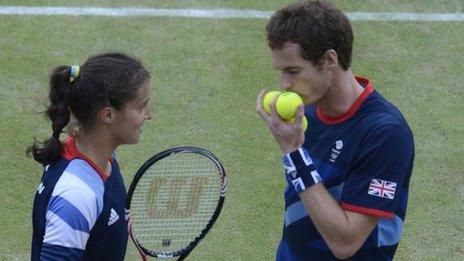Olympics: Andy Murray finally beats Federer when it counts
- Published
Archive: Murray beats Federer to win London 2012 gold
It might not be a Grand Slam, but Andy Murray can now call himself an Olympic champion after his stunning straight-sets win over Roger Federer.
Federer beat Murray to win his seventh singles crown at Wimbledon just last month, but the 25-year-old Briton, still attempting to land one of the four major titles, turned the tables in brilliant fashion to claim his most significant success to date.
BBC Sport speaks to former British players Tim Henman and Annabel Croft and seven-time Grand Slam champion Mats Wilander to assess what this victory might mean for Murray as he seeks to break the stranglehold of Federer, Rafael Nadal and Novak Djokovic.
How did he beat Federer?
Henman: "It was a relentless performance. He held serve from 15-40 down in the first game of the match and from that moment on he never let up. Every question that was asked of him, Murray came up with an answer. He won the second set 6-1 but saved seven break points. Federer wasn't at his best but that was largely because Murray didn't allow him to be. For Murray to win a best-of-five sets gold medal match against the greatest player that's ever lived is just amazing."
Croft: "His tennis all week was breathtaking. I had a gold medal stamped on his forehead even after the first match because of the way he was hitting the ball. He had that weight of shot that none of the other players seemed to have. He seemed so confident and composed, but I still feel he was playing within himself. He could have played even better, he could have carried on for another few hours. It was extraordinary."
Wilander: "Murray certainly learned a lot from the first set and a half of the Wimbledon final, when he was leading Federer and looking very good. He managed to maintain that level for the whole match today, playing aggressively throughout. He also went after the Federer forehand much more than he did that day."
How big a win is this?
Murray on 'biggest win' of career
Henman: "It may have been a best-of-three set tournament up until the final, but it was the same for everyone and I don't think it takes anything away from Andy's achievement. The fact that is was best-of-five sets for the final adds to the magnitude of his triumph. It was also on a court where Federer has won seven times, yet Murray was too good for him in every department."
Croft: "In Federer's press conference after beating Juan Martin del Potro in the semi-finals, he was asked about the number of players that have cried after losing big matches to him. He said those experiences are positive for his opponents, that the pain actually helps them improve. How significant given that, a couple of days later, a player he brought to tears at Wimbledon beat him in the Olympic final. The pressure will now be on Murray for the US Open. How he handles that pressure will tell us a lot about what he's capable of achieving in the coming years."
Wilander: "It has to be a huge stepping stone in terms of confidence. We all know that, physically, Andy Murray is a specimen. He is stronger and fitter than any other player. If he takes the ball as early as he did today, he's also got more variation in his game than any other player. We all knew that, but he had to improve on the mental side. Today, he perfected a game plan and then executed it to perfection."
Did the Olympic experience suit him?
Henman: "There has been so much momentum for Team GB. The crowd for the Wimbledon final, because of Federer's immense popularity, was pretty divided. Here, it was Murray's crowd and they were right behind him. Murray is a big sports fan and knew what had been going on with the rowing, the cycling and the athletics. He wanted to be a part of that. It's an amazing achievement and I'm so proud of him."
Croft: "The two-set format until the final definitely helped Murray, but I think he was unstoppable anyway. We will never know what might have happened against Djokovic in the semi-final if it had been a best-of-five set match, but something tells me this was destiny. It was meant to be."
Wilander: "It does seem like some players react differently when playing for their country. There is less pressure because the public is behind you whether you win or lose. At Wimbledon, it was very clear that Britain was behind him when he won, but not really with him when he lost. But that has changed now. The relationship between Murray and the British public has changed - and for the better."
What now for Murray?
Henman: "A gold medal at the Olympics is the pinnacle of sport. In the wider context, Djokovic won in Australia, Nadal won the French Open, Federer won Wimbledon and now Murray has won the Olympics. It could not be better poised for the US Open."
Croft: "The way Murray is playing will send shockwaves through the men's game. This should lift the mental barrier of beating one of the top players in a Grand Slam final - and that's a scary proposition for his rivals. When he's playing at his highest level, he is virtually unplayable. I wouldn't say he's got more talent than Federer, but he definitely seems more talented than Djokovic. He can do more with his hands. And as for Nadal, he's certainly lost ground having been off the tour for so long."
Wilander: "The US Open is very different but he will go there thinking he can win it. Now he has won the Olympics, it will probably be a little easier to win that first Grand Slam outside Britain. Of course, he now knows he can win at Wimbledon, but there will probably be less hysterics at the US Open, less attention. He goes there as one of the favourites and the other players are now going to look at him in a completely different light."
Henman, Croft and Wilander were speaking to David Ornstein
- Published5 August 2012

- Published5 August 2012

- Published5 August 2012
